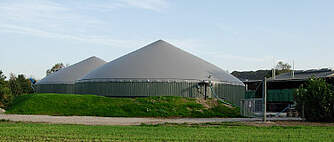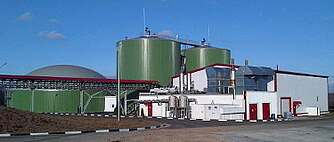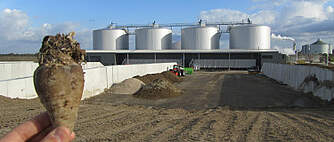Basics
In a biogas plant, biogas is generated in the form of a renewable, climate-neutral and cost-effective energy source from degradable organic matter. Therefore a biogas plant is a system for decentralised renewable energy generation. The organic substance undergoes anaerobic degradation by bacteria in the biogas fermenter, i.e. is broken down by bacteria, within a hermetically sealed environment. Various strains of microorganisms break down the carbon compounds of the organic substrates. At the end of this microbial food chain, biogas is generated as a metabolite. At 50-85%, combustible methane, in addition to carbon dioxide, is a major constituent of biogas and is the actual renewable energy source. This natural decomposition process also takes place in anaerobic zones in the soil, in lakes and ponds, but also in tanks for sewage sludge and in landfills (landfill gas).
Theoretically, in a biogas plant biogas can be obtained from practically any degradable organic substance. The bacteria only need sufficient time to break down even cellulose-rich substrate, for example. However, mushy, liquid substrates are particularly suitable, whereas lignified, dry substrates are better degraded in composting or used thermally in a biomass power plant etc., since lignin cannot be degraded under anaerobic conditions.
Using biogas
Biogas is versatile and can be flexibly used. One cubic metre of biogas replaces approx. 0.6 l heating oil. Unlike solar and wind energy, biogas can be stored and is therefore an ideal combination in the renewable energy mix. Base-load or demand-oriented energy feed-in is feasible. Biogas contributes to the decentralised renewable energy supply and reduces the burden on supra-regional power grids.
- Biogas can be used as a renewable form of energy in a gas engine to generate renewable power and heat in cogeneration. A biogas plant can supply multiple satellite cogeneration plants (CHPs) via biogas pipes. The CHPs can be used at the heat requirement location. The power generated is fed into the power grid. The heat is used at regional level and can be distributed across a local heating network.
- Biogas can be processed to meet natural gas specifications and fed into the gas network in the form of biomethane.
- Biogas can be used as fuel for vehicles. Processing can reduce the volume.
- Of course, biogas can also be used directly in boilers for heating, for cooking or for light.
Using digestate
Alongside biogas, a digestate is left over in the form of fermentation residue, and this contains all the nutrients included in the substrate, as well as material that is resistant to degradation. In most instances, therefore, the digestate is ideal as fertiliser and is used as a high-quality substitute for mineral fertiliser.
- Compared to liquid manure, digestate is considerably less odour-intensive, since odour-causing compounds are broken down. This leads to lower odour emissions during storage and in particular later during spreading.
- Reduction of methane and nitrous oxide emissions, which can occur with uncontrolled decomposition, e.g. in the storage of liquid manure.
- Digestate is more homogenous and therefore better to spread than liquid manure and more readily available to crops.
- The pH value of digestate is shifted to the alkaline range, so that the corrosive effect, as can occur with liquid manure (important in the case of leaf fertilisation!) is reversed.
- Due to the degradation processes, the nutrients are available in mineralised form (NH4-N, phosphate, etc.) and can thus be directly absorbed by the crops. Thus the nutrients are recycled and transported back into the soil.
- Digestate replaces expensive mineral fertiliser, which is produced in an energy-intensive process.
- The humus content of the soil is improved by fertilisation with digestate.
- Pathogens and weed seeds are largely destroyed in the fermenter.
- As spreading can only be carried out if the nutrients can also be used by the crops, in moderate to cold climates the digestate must be stored seasonally.
- The digestate can also be separated into solid and liquid digestate if direct application is not possible or not economical. The solid part is turned into compost or dried and used as fertiliser, processed into pellets, used as fuel or fertiliser and as bedding for animals. Where possible the liquid part is used as fertiliser, process water or it can also be processed to industrial water quality, producing a concentrated liquid fertiliser as a by-product.
- The processing (separation, drying, granulation, pelletising) reduces transport costs. Fermentation products can therefore be traded and passed on to third parties more easily.
Whereas in Germany, with almost 8,000 biogas plants, the potential of biogas plants has practically been exhausted, the global demand for biogas plants is increasing due to the demand for renewable, climate-friendly energy and due to the great potential of liquid manure, organic waste in the food industry and organic household waste. Ever since Krieg & Fischer was established in 1999, the company has operated abroad and can now boast more than 150 successful reference projects worldwide, 28 of which are located abroad.
Customised biogas concepts
- We plan and construct your biogas plant according to your requirements, the specific local conditions and individually tailored to your substrates.
- We help you to develop the optimum holistic concept (substrates, gas utilisation, digestate utilisation) for your biogas plant.
- We determine the appropriate pre-treatment for your substrates, not consuming more energy than is generated as a result of subsequent additional biogas gains.
- If your substrates contain impurities, we develop a customised process chain for processing your substrate. To achieve this we use wet or dry processing techniques.
- We select the appropriate fermentation process for your substrates.
- We put together the ideal components and aggregates for your system and your units.
- We set up your biogas plant so that it meets high safety standards.
- We put your plant components out for tender. And we identify the best suitable bidders.
- We oversee the construction of your biogas plant and safely commission your plant.


